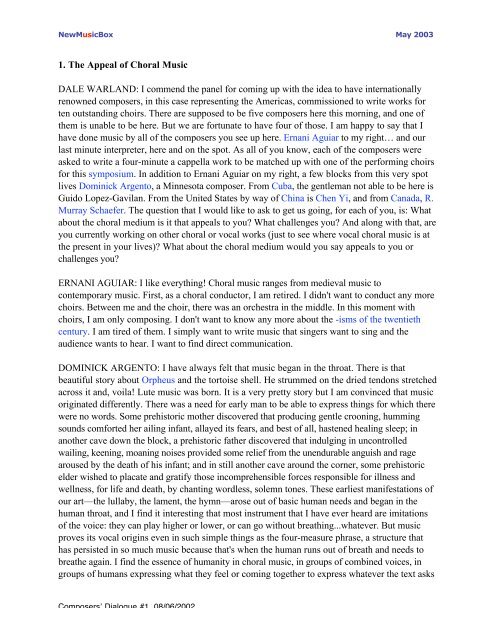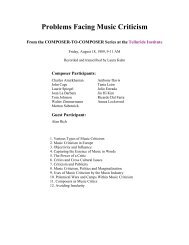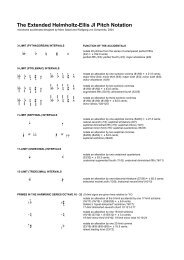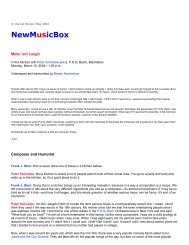Sixth World Symposium on Choral Music ... - NewMusicBox
Sixth World Symposium on Choral Music ... - NewMusicBox
Sixth World Symposium on Choral Music ... - NewMusicBox
You also want an ePaper? Increase the reach of your titles
YUMPU automatically turns print PDFs into web optimized ePapers that Google loves.
New<strong>Music</strong>Box May 2003<br />
1. The Appeal of <strong>Choral</strong> <strong>Music</strong><br />
DALE WARLAND: I commend the panel for coming up with the idea to have internati<strong>on</strong>ally<br />
renowned composers, in this case representing the Americas, commissi<strong>on</strong>ed to write works for<br />
ten outstanding choirs. There are supposed to be five composers here this morning, and <strong>on</strong>e of<br />
them is unable to be here. But we are fortunate to have four of those. I am happy to say that I<br />
have d<strong>on</strong>e music by all of the composers you see up here. Ernani Aguiar to my right… and our<br />
last minute interpreter, here and <strong>on</strong> the spot. As all of you know, each of the composers were<br />
asked to write a four-minute a cappella work to be matched up with <strong>on</strong>e of the performing choirs<br />
for this symposium. In additi<strong>on</strong> to Ernani Aguiar <strong>on</strong> my right, a few blocks from this very spot<br />
lives Dominick Argento, a Minnesota composer. From Cuba, the gentleman not able to be here is<br />
Guido Lopez-Gavilan. From the United States by way of China is Chen Yi, and from Canada, R.<br />
Murray Schaefer. The questi<strong>on</strong> that I would like to ask to get us going, for each of you, is: What<br />
about the choral medium is it that appeals to you? What challenges you? And al<strong>on</strong>g with that, are<br />
you currently working <strong>on</strong> other choral or vocal works (just to see where vocal choral music is at<br />
the present in your lives)? What about the choral medium would you say appeals to you or<br />
challenges you?<br />
ERNANI AGUIAR: I like everything! <strong>Choral</strong> music ranges from medieval music to<br />
c<strong>on</strong>temporary music. First, as a choral c<strong>on</strong>ductor, I am retired. I didn't want to c<strong>on</strong>duct any more<br />
choirs. Between me and the choir, there was an orchestra in the middle. In this moment with<br />
choirs, I am <strong>on</strong>ly composing. I d<strong>on</strong>'t want to know any more about the -isms of the twentieth<br />
century. I am tired of them. I simply want to write music that singers want to sing and the<br />
audience wants to hear. I want to find direct communicati<strong>on</strong>.<br />
DOMINICK ARGENTO: I have always felt that music began in the throat. There is that<br />
beautiful story about Orpheus and the tortoise shell. He strummed <strong>on</strong> the dried tend<strong>on</strong>s stretched<br />
across it and, voila! Lute music was born. It is a very pretty story but I am c<strong>on</strong>vinced that music<br />
originated differently. There was a need for early man to be able to express things for which there<br />
were no words. Some prehistoric mother discovered that producing gentle cro<strong>on</strong>ing, humming<br />
sounds comforted her ailing infant, allayed its fears, and best of all, hastened healing sleep; in<br />
another cave down the block, a prehistoric father discovered that indulging in unc<strong>on</strong>trolled<br />
wailing, keening, moaning noises provided some relief from the unendurable anguish and rage<br />
aroused by the death of his infant; and in still another cave around the corner, some prehistoric<br />
elder wished to placate and gratify those incomprehensible forces resp<strong>on</strong>sible for illness and<br />
wellness, for life and death, by chanting wordless, solemn t<strong>on</strong>es. These earliest manifestati<strong>on</strong>s of<br />
our art—the lullaby, the lament, the hymn—arose out of basic human needs and began in the<br />
human throat, and I find it interesting that most instrument that I have ever heard are imitati<strong>on</strong>s<br />
of the voice: they can play higher or lower, or can go without breathing...whatever. But music<br />
proves its vocal origins even in such simple things as the four-measure phrase, a structure that<br />
has persisted in so much music because that's when the human runs out of breath and needs to<br />
breathe again. I find the essence of humanity in choral music, in groups of combined voices, in<br />
groups of humans expressing what they feel or coming together to express whatever the text asks<br />
Composers’ Dialogue #1, 08/06/2002





